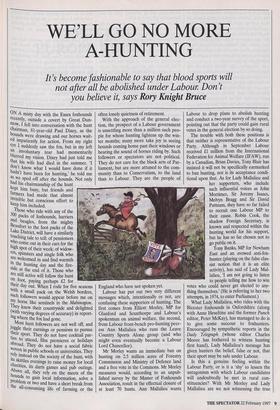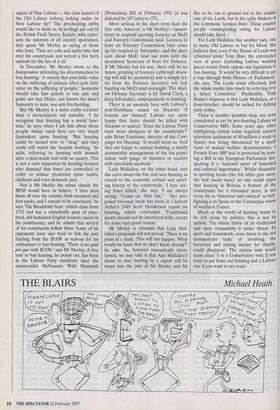WE'LL GO NO MORE A-HUNTING
It's become fashionable to say that blood sports will not after all be abolished under Labour. Don't
ON A misty day with the Essex foxhounds recently, outside a covert by Great Dun- mow, I fell into conversation with the hunt chairman, 81-year-old Paul Dixey, as the hounds were drawing and our horses wait- ed impatiently for action. From my right eYe I suddenly saw the fox, but in my left an involuntary tear had momentarily blurred my vision. Dixey had just told me that his wife had died in the summer. don't know what I would have done if it hadn't have been for hunting,' he told me as we sped off after the hounds. Not only had his chairmanship of the hunt kept him busy, but friends and farmers had made that almost invisible but conscious effort to keep him included. Those who ride with any of the 300 packs of foxhounds, harriers and beagles, from the mighty Beaufort to the foot packs of the Lake District, will have a similarly touching tale to tell: of pensioners who come out in their cars for the high spot of their week; of widow- ers, spinsters and single folk who are welcomed in and find warmth In the hunting day and the fire- side at the end of it. Those who are still active will follow the hunt on foot, paying perhaps £2 for their day out. When I rode for five seasons with a small pack on the Welsh borders, such followers would appear before me on my horse like sentinels in the Mabinogion. They knew their countryside and delighted (with varying degrees of accuracy) in report- ing where the fox had gone. Most hunt followers are not well off, and Juggle their earnings or pensions to pursue their sport. They do not have cocktail par- ties to attend, film premieres or holidays abroad. They do not have a social fabric woven in public schools or universities. They rely instead on the society of the hunt, with its skittles evenings to raise money for local chanties, its darts games and pub outings. Above all, they rely on the meets of the hounds to gain local information, solve a problem or two and have a short break from the all-consuming life of farming or the often lonely quietness of retirement.
With the approach of the general elec- tion, the prospect of a Labour government is unsettling more than a million such peo- ple for whom hunting lightens up the win- ter months; many more take joy in seeing hounds coming home past their windows or hearing the sound of horses riding by. Such followers or spectators are not political. They do not care for the black arts of Par- liament, but are more attuned to the com- munity than to Conservatism, to the land than to Labour. They are the people of England who have not spoken yet. Labour has put out two very different messages which, intentionally or not, are confusing these supporters of hunting. The first comes from Elliott Morley, MP for Glanford and Scunthorpe and Labour's spokesman on animal welfare, the second, from Labour front-bench pro-hunting peer- ess Ann Mallalieu who runs the Leave Country Sports Alone group (and who might even eventually become a Labour Lord Chancellor).
Mr Morley wants an immediate ban on hunting on 2.5 million acres of Forestry Commission and Ministry of Defence land and a free vote in the Commons. Mr Morley measures would, according to an unpub- lished survey by the Master of Foxhounds Association, result in the effectual closure of at least 70 hunts. Ann Mallalieu wants Labour to drop plans to abolish hunting and conduct a two-year survey of the sport, pointing out that the party could gain rural votes in the general election by so doing.
Tony Banks, MP for Newham East and an avowed anti-fox- hunter (playing on the false clas- sist notion that it is an elite activity), has said of Lady Mal- lalieu, 'I am not going to listen to people telling me how to win votes who could never get elected to any- thing themselves.' (He is referring to her two attempts, in 1974, to enter Parliament.) What Lady Mallalieu, who rides with the Bicester foxhounds in Oxfordshire (along with Anne Heseltine and the former Punch editor, Peter McKay), has managed to do is to give some succour to foxhunters. Encouraged by sympathetic reports in the Daily Telegraph (whose editor Charles Moore has bothered to witness hunting first hand), Lady Mallalieu's message has given hunters the belief, false or not, that their sport may be safe under Labour.
Is this a genuine feeling within the Labour Party, or is it a 'shy' to lessen the antagonism with which Labour candidates will undoubtedly be met in rural con- stituencies? With Mr Morley and Lady Mallalieu are we not witnessing the true aspect of New Labour — the class hatred of the Old Labour iceberg lurking under its New Labour tip? The pro-hunting lobby would like to think so. In writings put out by the British Field Sports Society, who repre- sent the interests of all country sportsmen, they quote Mr Morley as saying of those who hunt, 'They are yobs and snobs who riot over the countryside and torture a few furry animals for the fun of it all.'
In December, Mr Morley wrote to the Independent defending his determination to ban hunting: 'A society that puts little value on the suffering of animals often puts little value on the suffering of people.' Someone should take him quietly to one side and point out that Hitler, not known for man's humanity to man, was anti-fox-hunting.
But Mr Morley is a more crafty creature than a stereotypical old socialist. 'I do recognise that hunting has a social func- tion,' he says, when I ask him about those people whose rural lives are very much dependent upon hunting. 'But hunting could be turned over to "drag" and they could still watch the hounds working,' he adds, referring to hunting with hounds after a man-made trail with no quarry. This is not a view supported by hunting farmers who demand that foxes are controlled in order to reduce predation upon lambs, chickens and even domestic pets.
Nor is Mr Morley the urban classist the BFSS would have us believe. 'I have seen hunts all over the country, both mounted and foot packs, and I remain to be convinced,' he says. The Brocklesby hunt (which dates from 1710 and has a remarkable pack of pure- bred, old-fashioned English hounds) meets in his constituency, and he admits that several of his constituents follow them. Some of his opponents have also tried to link his past funding from the IFAW as reasons for his enthusiasm to ban hunting. 'There is no quid pro quo with IFAW,' says Mr Morley. A free vote to ban hunting, he points out, has been in the Labour Party manifesto since the unsuccessful McNamara Wild Mammals (Protection) Bill of February 1992 (it was defeated by 187 votes to 175).
More serious in the short term than the free vote, however, is Mr Morley's commit- ment to suspend sporting licences on MoD and Forestry Commission land. Licences to hunt on Forestry Commission land come up for renewal in November, and the deci- sion about MoD land use rests with the incumbent Secretary of State for Defence. If Mr Morley has his way, there will be no future granting of licences (although shoot- ing will still be permitted) and a simple let- ter from the Defence Secretary will halt hunting on MoD land overnight. The shad- ow Defence Secretary is Dr David Clark, a keen fell-walker, unsympathetic to hunting.
There is an anomaly here with Labour's post-Dunblane stance on firearms. If hounds are banned, Labour are quite happy that foxes should be killed with firearms or snared. 'Does the Labour Party want more shotguns in the countryside?' asks Brian Fanshawe, director of the Cam- paign for Hunting. 'It would seem so. And they are happy to replace hunting, a wholly accountable management of the fox popu- lation, with gangs of shooters or snarers with unreliable methods.'
Lady Mallalieu, on the other hand, says she cares about the fox, and sees hunting as crucial to the economy, culture and sport- ing history of the countryside. 'I hate see- ing foxes killed,' she says. 'I am always saying, "Come on, little liA." ' Her pro- posed two-year study has roots in Clement Attlee's 1949 Scott Henderson report on hunting, which concluded: 'Traditional sports should not be interfered with, except for some very good reason.'
Mr Morley is adamant that Lady Mal- 'alien's proposals will not prevail. 'There is no point in a study. That will not happen. What would we learn that we don't know already?' he asks. So, however romantically inten- tioned, we may take it that Ann Mallalieu's desire to save hunting by a report will be swept into the jaws of Mr Morley and his like to be run to ground not in the ermine vale of the Lords, but in the spiky thickets of the Commons' femless floor. Those country people contemplating voting for Labour should take heed.
Yet Lady Mallalieu has another tack, one to incite Old Labour to bay for blood. She believes that, even if the House of Lords was reformed under Tony Blair, the entrenched view of peers (including Labour working peers) would firmly oppose any legislation to ban hunting. 'It would be very difficult to get a ban through both Houses of Parliament,' she says. The Lords could effectively kick the whole matter into touch by referring it to a Select Committee.' Predictably, Tony Banks's response is that Lady Mallalieu, as a front-bencher, should be sacked for defying party policy. There is another possible step, not even considered as yet by pro-hunting Labour or Conservative MPs. Some years ago, when bullfighting (which today regularly attracts television audiences of 40 million a week in Spain) was being threatened by a small band of animal welfare demonstrators, a French Euro MP had it protected by pass- ing a Bill in the European Parliament des- ignating it a 'national sport of historical and cultural importance'. Whilst dissimilar in sporting terms (the fox often gets away, the bull rarely does), no one could argue that hunting in Britain, a feature of the countryside for a thousand years, is not every bit as 'historical and cultural' as bull- fighting is to Spain or the Carmargue towns of southern France.
Much as the world of hunting wants to be left alone by politics; this is not all option. The whole fabric of its traditional and open community is under threat. Its sport and framework, even down to the not unimportant tasks of involving the bereaved and raising money for charity, could disappear. The option now would seem clear: it is a Conservative vote if you want to see foxes out hunting and a Labour one if you want to see tears.



























































 Previous page
Previous page